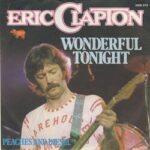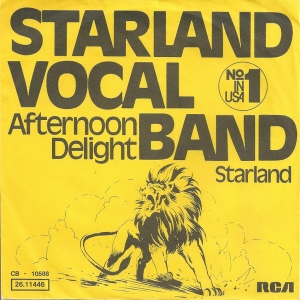 There’s a special intimacy in the quiet moments before a night out—the rustle of a dress, the click of a watch, the unspoken admiration between two people who’ve known each other long enough to appreciate the small gestures. Eric Clapton captured that quiet beauty perfectly in 1977 with his timeless ballad “Wonderful Tonight.” The song, featured on his album Slowhand, is not just one of Clapton’s most beloved works—it’s one of the most tender love songs ever recorded. Written for Pattie Boyd, Clapton’s muse and then-partner, “Wonderful Tonight” is a snapshot of domestic simplicity elevated to poetry. It’s the kind of song that doesn’t need fireworks or dramatic declarations; it thrives in the gentle rhythm of appreciation and devotion.
There’s a special intimacy in the quiet moments before a night out—the rustle of a dress, the click of a watch, the unspoken admiration between two people who’ve known each other long enough to appreciate the small gestures. Eric Clapton captured that quiet beauty perfectly in 1977 with his timeless ballad “Wonderful Tonight.” The song, featured on his album Slowhand, is not just one of Clapton’s most beloved works—it’s one of the most tender love songs ever recorded. Written for Pattie Boyd, Clapton’s muse and then-partner, “Wonderful Tonight” is a snapshot of domestic simplicity elevated to poetry. It’s the kind of song that doesn’t need fireworks or dramatic declarations; it thrives in the gentle rhythm of appreciation and devotion.
By the late 1970s, Clapton was emerging from one of the most tumultuous periods of his life. He’d battled addiction, navigated heartbreak, and found himself reestablishing his artistic identity. Amid all that chaos, “Wonderful Tonight” emerged like a breath of calm—a reminder that sometimes love isn’t about grand gestures, but about simply being there, seeing someone fully, and saying what’s true. Written during an ordinary evening while waiting for Pattie to get ready for a party hosted by Paul and Linda McCartney, the song’s origins couldn’t be more mundane. Yet somehow, out of that ordinary moment, Clapton created something extraordinary.
“Wonderful Tonight” has become more than just a slow dance favorite or a wedding staple—it’s a universal anthem for tenderness, for gratitude, for those quiet pauses in life when words fall short and music does the speaking.
The Making of a Classic
Eric Clapton’s Slowhand was released in November 1977, and it remains one of the defining albums of his solo career. Nestled among blues-driven tracks like “Cocaine” and “Lay Down Sally,” “Wonderful Tonight” stands out for its vulnerability. It’s simple, understated, and deeply personal. The song was recorded at Olympic Studios in London, with producer Glyn Johns helping shape the soft, warm tone that has since become iconic.
Clapton’s inspiration struck one evening while Boyd was preparing for a social event. As she changed outfits and asked how she looked, Clapton picked up his guitar and began to strum what would become the song’s opening lines. By the time they left for the party, the song was essentially finished—a love letter in real time. It’s fitting that something so enduring was born from such an everyday moment.
“Wonderful Tonight” reflects the clarity of Clapton’s emotional landscape at that time. After years of turmoil—his obsession with Boyd while she was still married to his friend George Harrison, the heartbreak that inspired “Layla,” and his descent into heroin addiction—he had finally found peace, if only for a while. The song captures that fleeting tranquility with almost cinematic simplicity.
The Sound of Sincerity
The beauty of “Wonderful Tonight” lies in its restraint. Clapton’s guitar tone is soft and expressive, his fingers gliding across the strings with a tenderness that matches the lyrics. The song is built around a slow, swaying rhythm that mirrors the easy intimacy of its message. Every note feels deliberate, every pause meaningful.
Unlike the explosive solos or bluesy intensity Clapton was known for, “Wonderful Tonight” trades virtuosity for vulnerability. His voice isn’t showy—it’s conversational, almost hushed, as if he’s singing directly into the ear of the person he loves. There’s no pretense, no metaphor, just a man telling a woman she looks beautiful and that he’s grateful for her.
The guitar solo, understated yet rich in tone, feels like a sigh. It’s one of Clapton’s most elegant moments as a player, not because of its complexity, but because of its emotion. It doesn’t aim to impress; it aims to communicate. That’s why it still resonates with listeners decades later.
A Moment Immortalized
The lyrics are deceptively simple:
“It’s late in the evening / She’s wondering what clothes to wear / She puts on her makeup / And brushes her long blonde hair.”
Those lines could have easily been forgettable in less capable hands, but Clapton imbues them with affection and sincerity. There’s something profoundly relatable about the domestic scene he paints—no metaphors, no grand setting, just two people preparing for an evening out, sharing a quiet connection.
Then comes the chorus:
“And then she asks me, ‘Do I look all right?’ / And I say, ‘Yes, you look wonderful tonight.’”
It’s almost too simple, but that’s the genius of it. The power lies in its plainness. It doesn’t rely on elaborate poetry or ornate phrasing. It’s the kind of thing you might say to someone you love without thinking twice, yet in this song, those words become eternal.
Later in the song, Clapton flips the focus back on himself:
“It’s time to go home now, and I’ve got an aching head / So I give her the car keys, and she helps me to bed.”
Even here, amid exhaustion and imperfection, there’s love. She helps him to bed. He looks at her and realizes just how lucky he is. It’s that last line—“And I say, ‘My darling, you were wonderful tonight’”—that ties it all together. It’s not about the night, the party, or the people around them. It’s about the quiet, enduring gratitude of companionship.
The Real Love Behind the Song
At the heart of “Wonderful Tonight” is Clapton’s relationship with Pattie Boyd—a muse whose influence spans some of the greatest love songs in rock history. She had already been immortalized by George Harrison in “Something” and by Clapton in “Layla.” But where “Layla” was tortured and desperate, “Wonderful Tonight” is peaceful and contented.
For a brief time, Clapton and Boyd represented a kind of redemption narrative: love conquering turmoil. The song captures that brief period when things were right between them. Sadly, the serenity wouldn’t last. Their marriage eventually crumbled under the strain of Clapton’s continued struggles with alcohol and infidelity. Yet, despite their eventual separation, “Wonderful Tonight” remains a testament to what was good between them—a snapshot of love in its purest, most fleeting form.
Boyd herself has spoken fondly of the song, saying that while it’s bittersweet to hear now, she’s proud of the beauty it represents. For Clapton, it became both a blessing and a burden—one of his most requested songs, but also a reminder of a chapter in his life that was both joyful and painful.
From Weddings to Arenas
Over the decades, “Wonderful Tonight” has transcended its personal origins to become one of the most recognizable love songs in modern music. It’s been played at countless weddings, covered by artists across genres, and used in films and television to underscore moments of tenderness.
Part of its power lies in its universality. Anyone who’s ever been in love—or simply admired someone deeply—can relate to its sentiment. It doesn’t matter if you’re a blues purist, a pop fan, or someone who only listens to slow dances once a year; “Wonderful Tonight” speaks to everyone.
On stage, the song takes on an even more poignant dimension. Clapton’s live performances often stretch the guitar solo, letting the melody linger like a conversation that neither party wants to end. The audience sways, often singing along in hushed voices. There’s an intimacy in those performances that’s rare for stadium shows—proof that even decades after its release, the song’s magic hasn’t dimmed.
The Slowhand Effect
When Slowhand hit shelves in 1977, it was more than just another Clapton record—it was a career renaissance. After the raw, uncertain energy of 461 Ocean Boulevard and the darker introspection of No Reason to Cry, Slowhand reestablished Clapton as one of rock’s premier artists. The album balanced blues, rock, and pop in a way that showcased his versatility without compromising authenticity.
“Wonderful Tonight” was the emotional anchor of the record. Alongside tracks like “Cocaine” and “Lay Down Sally,” it added depth and contrast. Where “Cocaine” was edgy and provocative, “Wonderful Tonight” was graceful and sincere. The two sides of Clapton—the rocker and the romantic—finally coexisted in harmony.
Critics and fans alike recognized the song’s timeless quality immediately. It wasn’t flashy or innovative in the technical sense, but it was perfect in its execution. The song didn’t need to chase trends because it operated outside of them.
The Enduring Legacy
Nearly half a century later, “Wonderful Tonight” still stands as one of the most enduring ballads ever written. It’s one of those rare songs that never loses its luster, no matter how many times you hear it. That’s because it’s built on something timeless: sincerity.
There’s no artifice, no lyrical gymnastics—just love expressed plainly and beautifully. It’s the kind of song that can make even the most cynical listener pause. Whether it’s played softly in a candlelit room or drifting through speakers at a crowded reception, it has a way of stopping time, if only for a few minutes.
For Eric Clapton, “Wonderful Tonight” represents both a personal triumph and a universal truth. It’s the song that reminds us that love isn’t always dramatic or complicated—it can be found in the quiet moments before stepping out the door, in the shared glances, in the unspoken appreciation for someone simply being there.
A Song That Still Glows
Listening to “Wonderful Tonight” today feels like opening a time capsule that hasn’t aged a day. The warmth of Clapton’s voice, the gentle pacing, and that unmistakable guitar tone still radiate sincerity. It’s easy to see why generations have embraced it—it’s not about perfection, but presence.
The song endures because it feels real. It’s the sound of two people inhabiting the same moment, aware of each other’s beauty and fragility. It’s the soundtrack to countless memories, both personal and shared.
For all his legendary guitar work, it might just be this simple ballad that defines Eric Clapton’s legacy most clearly. It proves that sometimes the greatest love songs aren’t written in fits of passion or heartbreak—they’re written on quiet nights, waiting for someone you love to get ready, guitar in hand, heart full.
Because, after all these years, Eric Clapton’s message remains as true now as it was in 1977:
“You look wonderful tonight.”


